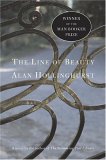Summary | Excerpt | Reviews | Readalikes | Genres & Themes | Author Bio

"Looking after the Cat" was how Gerald had put it before they went away, with the suggestion that the task was as simple as that, and as responsible. It was Catherine's house but it was Nick who was in charge. She camped nervously in the place, as though she and not Nick was the lodger. She was puzzled by his love of its pompous spaces, and mocked his knowledgeable attachment to the paintings and furniture. "You're such a snob," she said, with a provoking laugh; coming from the family he was thought to be snobbish about, this was a bit of a facer. "I'm not really," said Nick, as if a small admission was the best kind of denial, "I just love beautiful things." Catherine peered around comically, as though at so much junk. In her parents' absence her instincts were humbly transgressive, and mainly involved smoking and asking strangers home. Nick came back one evening to find her drinking in the kitchen with an old black minicab driver and telling him what the contents of the house were insured for.
At nineteen she already had a catalogue of failed boyfriends, each with a damning epithet, which was sometimes all Nick knew them by: "Crabs" or "Drip-Dry" or "Quantity Surveyor". A lot of them seemed almost consciously chosen for their unacceptability at Kensington Park Gardens: a tramplike Welshman in his forties whom she'd met in the Notting Hill Record Exchange; a beautiful punk with FUCK tattooed on his neck; a Rastafarian from round the corner who moaned prophetically about Babylon and the downfall of Thatcher. Others were public schoolboys and sleek young professionals on the make in the Thatcher slump. Catherine was slight but physically reckless; what drew boys to her often frightened them away. Nick, in his secret innocence, felt a certain respect for her experience with men: to have so many failures required a high rate of preliminary success. He could never judge how attractive she was. In her case the genetic mixture of two good-looking parents had produced something different from Toby's sleepy beauty: Gerald's large confidence-winning mouth had been awkwardly squashed into the slender ellipse of Rachel's face. Catherine's emotions always rushed to her mouth.
She loved anything satirical, and was a clever vocal mimic. When she and Nick got drunk she did funny imitations of her family, so that oddly they seemed not to have gone away. There was Gerald, with his facetious boom, his taste for the splendid, his favourite tags from the Alice books. "Really, Catherine," protested Catherine, "you would try the patience of an oyster." Or, "You recall the branches of arithmetic, Nick? Ambition, Distraction, Uglification, and Derision. . . ?" Nick joined in, with a sense of treacherously bad manners. It was Rachel's style that attracted him more, as a code both aristocratic and distantly foreign. Her group sounded nearly Germanic, and the sort of thing she would never belong to; her philistine, pronounced as a French word, seemed to cover, by implication, anyone who said it differently. Nick tried this out on Catherine, who laughed but perhaps wasn't much impressed. Toby she couldn't be bothered to mimic; and it was true that he was hard to "get". She did a funny turn as her godmother, the Duchess of Flintshire, who as plain Sharon Feingold had been Rachel's best friend at Cranbome Chase school, and whose presence in their lives gave a special archness to their joke about Mr Duke the odd-job man. The Duke that Sharon had married had a twisted spine and a crumbling castle, and the Feingold vinegar fortune had come in very handy. Nick hadn't met the Duchess yet, but after Catherine's impression of a thoughtless social dynamo he felt he'd had the pleasure without the concomitant anxiety.
Nick never talked to Catherine about his crush on her brother. He was afraid she would find it funny. But they talked a good deal about Leo, in the week of waiting, a week that crawled and jumped and crawled. There wasn't much to go on, but enough for two lively imaginations to build a character from: the pale-blue letter, with its dubious ascenders; his voice, which only Nick had heard, in the stilted cheerful chat which finalized the plans, and which was neutrally London, not recognizably black, though he sensed a special irony and lack of expectation in it; and his colour photograph, which showed that if Leo wasn't as handsome as he claimed he still demanded to be looked at. He was sitting on a park bench, seen from the waist up and leaning back - it was hard to tell how tall he was. He was wearing a dark bomber jacket and gazed away with a frown, which seemed to cast a shadow over his features, or to be a shadow rising within them. Behind him you could see the silver-grey crossbar of a racing bike, propped against the bench.
From The Line of Beauty by Alan Hollinghurst, pages 3-17.Copyright 2004 by Alan Hollinghurst. All rights reserved. No part of this book may be used or reproduced in any manner whatsoever without written permission from the publisher, except in the case of brief quotations embodied in critical articles or reviews. Reproduced by permission of Bloomsbury Publishing.
Great political questions stir the deepest nature of one-half the nation, but they pass far above and over the ...
Click Here to find out who said this, as well as discovering other famous literary quotes!
Your guide toexceptional books
BookBrowse seeks out and recommends the best in contemporary fiction and nonfiction—books that not only engage and entertain but also deepen our understanding of ourselves and the world around us.